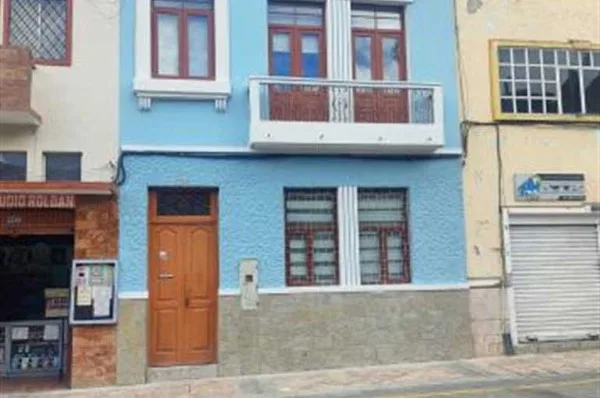The gringo impact on Cuenca: Some Cuencanos say it is creating problems for the locals
By Dr. Lee Dubs
One of the recent talking points among the English-speaking immigrant community in Cuenca is the Ecuadorian government’s announced study of the impact of foreign residents in the country. There is a reason for the study. An official in the local office of the Ministry of Foreign Relations once told this writer, “Hardly a day goes by that I don’t have Cuencanos in my office saying ‘Do something about the gringos’.” An impact study may be a step toward “doing something.” As similar studies in other countries have shown, there are positive and negative impacts of immigration. The negative aspects get most of the attention, of course.
writer, “Hardly a day goes by that I don’t have Cuencanos in my office saying ‘Do something about the gringos’.” An impact study may be a step toward “doing something.” As similar studies in other countries have shown, there are positive and negative impacts of immigration. The negative aspects get most of the attention, of course.

Cuenca has seen a large influx of North Americans.
The following is a brief look at a few areas where many Ecuadorians perceive the negative impact of North American immigration in their country, and some people demand remedial action. Only a couple thousand native English speakers live in Cuenca; the often cited higher figures include speakers of other languages and hundreds who may have once lived here. We constitute less than one percent of the population, but our presence is visible. What follows are some Ecuadorian points of view, including actual translated statements. These may not always represent facts, but they do tell us how they see things, the generalizations they make, and the stories they tell each other. Some stories become embellished with each retelling, but they are the tales that government officials hear. As we say, perception is reality.
This writer — a long-time resident and fluent Spanish speaker — has heard the following statements from local citizens. The purpose of this article is informational, not judgmental. Whether the rumors are factual as related or have become exaggerated, foreign residents will do well to pay attention and consider how to respond positively. Some will react with defensive rebuttals and accusations of their own, but perhaps the majority will pay attention to what Cuencanos are telling each other about us and will seek ways to undo the negativity. These are in no particular order.
- “The gringos are overwhelming our medical facilities.” According to locals in Cuenca, gringos take advantage of the socialized medical system and flock to the free public regional hospital and the low-cost social security (IESS) hospital because most are too cheap to pay for private care. In addition, they say that foreigners are given priority service, getting ahead of locals who patiently await their turn. They believe that every overweight or limping gringo they see on the street is in their country just to take advantage of their medical system. There are reports that some foreigners even obtained expensive private care, arranged payment plans, and then flew back home without paying.
- “The foreigners have driven prices up so much that we can’t afford to buy property in our own country.” It is a fact that since they first started arriving in Cuenca in large numbers, English-speaking immigrants have been overpaying for many items, especially for real estate. They tend to compare prices only to those in their home country and do not realize how often they are being overcharged. As a result, prices started rising quickly and real estate costs are now too high for many Ecuadorians. Immigrants blame avaricious sellers for inflating prices, and the locals blame the gringos for paying too much. They also accuse foreigners of duplicity by overpricing their own property when they sell.
- “I am tired of hearing the foreigners say they came to my country because it’s cheap. Can’t they say anything else?” Locals often hear immigrants list cost of living as the first — or only — reason they are here. They are proud of their country and want to hear that foreigners are attracted by more than economics.
- “Gringos line up at SRI (the tax office) to get their I.V.A. (12% national Value Added Tax) refunded, and they do not deserve it. Our country needs money, and the greedy gringos don’t want to pay their share.” That tax refund was established as a reward for elderly citizens of limited income who paid taxes all their lives. A loophole allows any “third age” lower income resident to qualify. Ecuadorians resent what they see as newly-arrived foreigners getting money that they claim they are “entitled to.” The gringos want public services but do not want to pay taxes for them, according to locals, who feel that foreigners do not merit any tax refund and are milking the system. The presence of foreigners in the SRI office is offensive to many locals, who are unaware that large numbers of gringo expats refuse to accept those tax refunds.
- “They come here to make money and to compete with our own businesses.” There is a growing assumption that more and more immigrants are here to make money, not quietly retire, and that they are hurting local businesses, especially the restaurants and hotels. Cuencanos have reported that some foreigners are running underground operations without a business permit, not paying taxes, and never hiring Ecuadorian employees.
- “Gringos want Ecuadorian citizenship for selfish reasons. They do not long to be citizens here just because they love our country so much. They want to be citizens for some personal advantage.”
- “These English-speaking hypocrites expect us to change our language just for them.” Locals accuse Americans of demanding that immigrants in the U.S. speak English, but when they are the immigrants they refuse to learn the local language.
- “I have seen these guests in my country yelling at employees in the bank and in the Supermaxi.” A variation to this is, “I heard gringos in a restaurant telling each other everything they hate about my country.” Some immigrants have verbally abused locals and spoken badly (and loudly) about them in public. Each incident of “Ugly American” behavior is told and retold many times. Disparaging remarks and accusations (e.g., “Why don’t these people speak English?”), trying to get ahead of Ecuadorians in bank lines, and other acts of arrogance have the general populace talking and reporting.
These are the most common complaints, and some retaliation has been reported. Foreign residents in Cuenca tell of being elbowed off sidewalks and being verbally accosted. “You need to go back to your own country where you belong!” has been shouted at some foreigners. Cuencanos are beginning to focus on the negative aspects of immigration. Many of them scoff at the gringo claims that “there are so many of us here” and “we do so much for this economy” as excuses for demanding changes in language and culture. Their complaints are being heard at high levels. An impact study is underway.
Everyone has his or her own perceptions of reality, and the point of this article is to inform English-speaking immigrants in Cuenca what those perceptions are to increasing numbers of our hosts. Whether or not we agree is irrelevant; we are looking here at their reality, not ours.
In 2010, there was a now-defunct Cuenca magazine called “¿Azuay Are We Here?” I complied with a request to write an article on the growing influx of North American immigrants. I emphasized the positive advantages of such immigration, but I did note some conflicts in other parts of the country. In my conclusion I asked this question: “How long will Cuencanos tolerate us before we see some major negative reaction here in Azuay?” I then offered hope: “Fortunately, the answer to that question is in our own hands. We control our future in Ecuador by how we act now.” (April/May Issue, 2010, Page 19).
That is still true.
________________
Dr. Lee Dubs first visited Cuenca in the early 1960s and has been a full-time resident since 2004. A retired language professor from North Carolina, he and his wife, Carol, are the owners of Carolina Bookstore on Calle Hermano Miguel at Calle Larga.


















